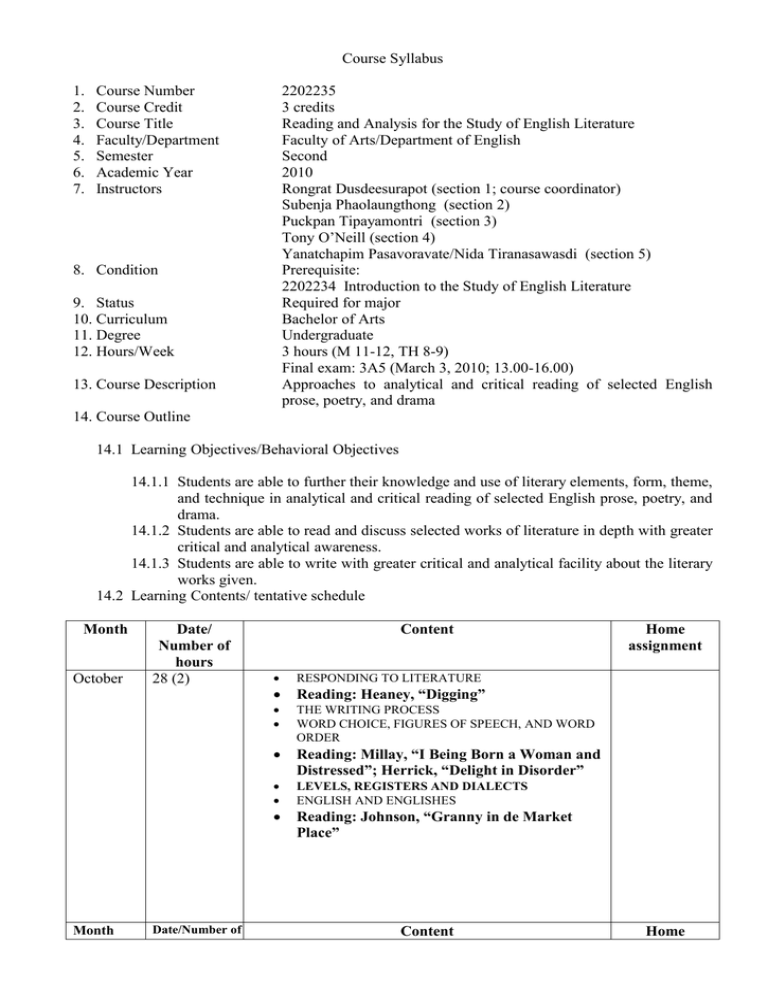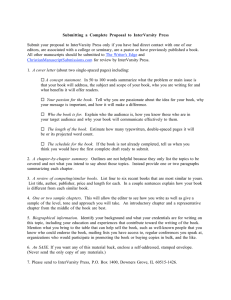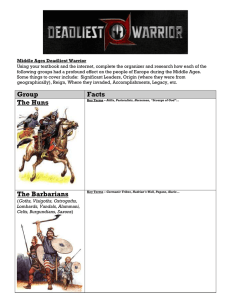
Course Syllabus
1.
2.
3.
4.
5.
6.
7.
Course Number
Course Credit
Course Title
Faculty/Department
Semester
Academic Year
Instructors
2202235
3 credits
Reading and Analysis for the Study of English Literature
Faculty of Arts/Department of English
Second
2010
Rongrat Dusdeesurapot (section 1; course coordinator)
Subenja Phaolaungthong (section 2)
Puckpan Tipayamontri (section 3)
Tony O’Neill (section 4)
Yanatchapim Pasavoravate/Nida Tiranasawasdi (section 5)
Prerequisite:
2202234 Introduction to the Study of English Literature
Required for major
Bachelor of Arts
Undergraduate
3 hours (M 11-12, TH 8-9)
Final exam: 3A5 (March 3, 2010; 13.00-16.00)
Approaches to analytical and critical reading of selected English
prose, poetry, and drama
8. Condition
9. Status
10. Curriculum
11. Degree
12. Hours/Week
13. Course Description
14. Course Outline
14.1 Learning Objectives/Behavioral Objectives
14.1.1 Students are able to further their knowledge and use of literary elements, form, theme,
and technique in analytical and critical reading of selected English prose, poetry, and
drama.
14.1.2 Students are able to read and discuss selected works of literature in depth with greater
critical and analytical awareness.
14.1.3 Students are able to write with greater critical and analytical facility about the literary
works given.
14.2 Learning Contents/ tentative schedule
Month
October
Date/
Number of
hours
28 (2)
Content
RESPONDING TO LITERATURE
Reading: Heaney, “Digging”
Month
Date/Number of
Home
assignment
THE WRITING PROCESS
WORD CHOICE, FIGURES OF SPEECH, AND WORD
ORDER
Reading: Millay, “I Being Born a Woman and
Distressed”; Herrick, “Delight in Disorder”
LEVELS, REGISTERS AND DIALECTS
ENGLISH AND ENGLISHES
Reading: Johnson, “Granny in de Market
Place”
Content
Home
2
hours
November 1 (1)
Assignment
WRITING ABOUT SOUND PATTERNS, LINE
BREAKS AND POETIC METER
Reading: Frost, “Design”
November 4 (2)
November 8 (1)
Reading: Mora, “Immigrants”;
Yamada, “To the Lady”;
Olds, “On the Subway”;Mattera, “Afrika Road”
November 11 (2)
WRITING ARGUMENT ABOUT LITERATURE
AMBIGUITY AND IRONY
LITERARY GENRES AND READERS’ EXPECTATION
WRITING ABOUT LITERATURE
SOME CRITICAL APPROACHES
USING RESEARCH TO WRITE ABOUT
LITERATURE
COMMON THEMES
Reading: Excerpts from Guerin et al.,
A Handbook of Critical Approaches
Reading: Walker, “Everyday Use”
November 18 (2)
Reading: Bennet, “The Colony”
Reading: Coetzee, Waiting for the Barbarians
Reading: Waiting for the Barbarians;
Coetzee, “Into the Dark Chamber: The Writer and
the South African State”
November 22-29 (6)
Waiting for the Barbarians
December
2-16 (7)
Reading: Nottage, Ruined; reading supplements
December
6 (1)
No class (Compensation)
December
20 (1)
No class
December
23 (2)
Midterm exam
December
27-30 (3)
January
3 (1)
January
6 (2)
January
10 (1)
January
13 (2)
Intervarsity Games (No class)
January
17(1)
Intervarsity Games (No class)
January
20 (2)
Intervarsity Games (No class)
Month
Date/Number of
hours
November 15 (1)
Reading: Friel, Molly Sweeney;
Keller, “ Three Days to See”
No class
Reading: O’Connor, “Good Country People”;
a supplementary text
Intervarsity Games (No class)
Content
Home
Assignment
3
Reading: Sedaris, “Me Talk Pretty”;
Ives, The Philadelphia
Reading: Bishop, Duffy, “Valentine”; “One Art”;
supplementary texts
January
24 (2)
January
27 (1)
January
31 (2)
*Peer critique
February
3-17 (8)
Reading: A full-length novel (to be announced)
14.3 Method
14.3.1 Lecture and discussion
14.3.2 Brainstorming and discussion of
case study so that students learn to
analyze and solve problems
14.3.3 Making a summary of the main points
or presentation of the results of researching
or the assigned tasks
14.4 Media
14.4.1 Transparencies and opaque sheets
14.4.2 PowerPoint presentations
14.4.3 Internet media
14.4.4 Audiocassettes, audio CDs, DVDs
70 percent
25 percent
5 percent
14.5 Assignment through Network System
Depending on the section instructor, students may submit certain assignments via e-mail
14.6 Evaluation
14.6.1 Assessment of Academic Knowledge
Midterm exam
Final
14.6.2 Assessment of Work and
Classroom Activities
(attendance, participation, presentations)
14.6.3 Assessment of the Assigned Tasks
(at least 4 reading responses, other)
14.6.4 Final paper (4–6 pp.)
50 points
70 points
25 points
25 percent
35 percent
12.5 percent
35 points
17.5 percent
20 points
10 percent
Plagiarism Policy: Plagiarism is a serious offence and will be severely penalized in this
course. Plagiarized work will receive 0 marks or an F grade.
Grading policy: Evaluation will be criterion-based and group-based. with letter grades
assigned roughly according to the following criteria:
80–100
75–79
70–74
65–69
A
B+
B
C+
15. Tentative Reading List
15.1 Required Texts
60–64
55–59
50–54
0–49
C
D+
D
F
4
15.1.1 Coursebook
15.1.2 Coetzee, J. M. Waiting for the Barbarians.
15.1.3 Nottage, Lynn. Ruined.
15.1.4 A full-length novel ( to be announced )
15.2 Supplementary Texts
15.2.1 Bennett, Andrew, and Nicholas Royle. Introduction to Literature, Criticism and
Theory, 3rd ed. Harlow: Pearson-Longman, 2004.
15.2.2 Ferster, Judith. Arguing through Literature: A Thematic Anthology to Academic
Writing. New York: McGraw-Hill, 2005.
15.2.3 Guth, Hans P., and Gabriele L. Rico. Discovering Literature: Fiction, Poetry and
Drama. New Jersey: Prentice Hall, 1993.
15.2.4 Holman, C. Hugh, and William Harmon. A Handbook to Literature. 6th ed. New
York: Macmillan. 1992.
15.2.5 Whitla, William. The English Handbook: A Guide to Literary Studies. Oxford: WileyBlackwell, 2010.
15.2.6 MLA Handbook for Writers of Research Papers. 7th ed. New York: Modern
Language Association of America, 2009.
15.3 Research Articles/Academic Articles
See coursebook and course blackboard.
15.4 Electronic Media or Websites
15.4.1 http://pioneer.netserv.chula.ac.th/~tpuckpan/235-2010b-readanalstudlit.
15.4.2 blackboard.it.chula.ac.th
16. Teacher Evaluation
16.1 Chulalongkorn University Online Evaluation Form 08
16.2 Changes have been made in accordance with the previous evaluation e.g. adjustments in
content, quantity and type of reading material, examination and assignments, and teaching
method.
16.3 Discussion, analysis, and class conduct which creates desirable qualifications of
Chulalongkorn University graduates: intellectual challenge and academic knowledge;
reading, writing, speaking and listening skills; ethics
17. Discussion, analysis, and class conduct which creates desirable qualifications of Chulalongkorn
University graduates: intellectual challenge and academic knowledge; reading, writing, speaking
and listening skills; ethics





